The fastest trains in the world in 2025 are trains with incredibly high speeds you may not have thought of. Most of them are Maglev (magnetic levitation) trains that levitate above the line (track) with no contact between the rail and the body.
These trains are the fastest ground vehicle. There is one of the fastest trains mentioned below that the journey that will take 2 hours by an airplane will only take this train by 2.5 hours while the same journey distance will take 5.5 hours by other high-speed trains.
Here are the top 15 world's fastest trains 2025 list (+ In Kmph),
they are,
- Japan's LO Series Maglev
- CRRC Qingdao Sifang 2021Maglev
- JR Central MLX01 Maglev Train
- TGV POS
- CRH380A Hexie
- Shanghai Maglev
- HEMU-430X
- Fuxing Hao CR 400AF
- Frecciarrossa 1000
- Talgo AVRIL HSR
- Bombardier Zefiro 380
- Shinkansrn E5 & H5 Series
- AGV 575
And three more high-speed trains. Check these VHS (very high speed) trains out, their top and operating speed in kmph, their length, formation, and lots more.
Keep reading!
16. Velaro Rus
 |
| Image credit: Sergey Korovkin 84 |
Top Speed: 300 km/h (186.2 mph)
Operational Speed: 250 km/h (155.3 mph)
Train length: 820.2 feet (250 meters)
Passengers' capacity: Up to 556
Formation: 10 cars
Country: Russia
Manufacturer: Siemens
Year manufactured: 2008 to present
With the speed of the train, it only takes 3.5 hours from Moscow to St. Petersburg in Russia which is 650 kilometers. There are two versions of the train, one with a dual-system train for 3 kV DC and 25 kV AC and then a single-system train for 3 kV DC.
They are unique trains, even at a very low temperature, that can be -40°C or +40°C they still perform very high. Each train has insulation, a cooling system, and specially adapted ventilation. Certainly, it is one of the fastest trains in the world in 2025.
15. AVE
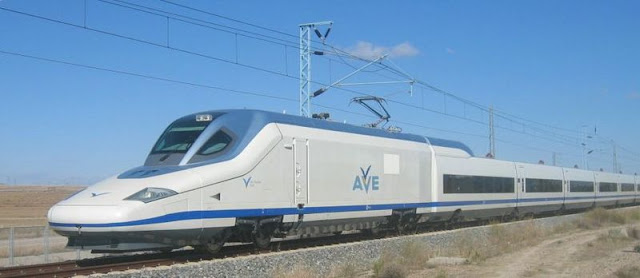 |
| Image credit: Peter Christener (Pechristener) |
Top Speed: 350 km/h (220 mph)
Operational Speed: 330 km/h (210 mph)
Train length: 656.1 feet (200 meters)
Passengers capacity: 318 (for S-102) & 365 (for S-112)
Formation: 8 cars
Country: Spain
Manufacturer: Talgo, Bombardier
Year manufactured: 2005 to present
AVE is an acronym for Tren de Alta Velocidad Española. They are efficient, luxurious long-distance high-speed trains. They are very fast trains that run mostly from Madrid to Cordoba, Malaga, Valencia, and Seville in Spain.
And even between Barcelona and Madrid, which is a popular AVE train route. From Madrid to Sevilla, for ordinary train, it might take 6 to 9 hours, but with AVE it only takes 2 hours 20 minutes. From its speed, it is one of the world's fastest trains in 2025.
Going by this train is sometimes considered by some passengers as quicker than flying. Unlike a plane, you do not need to book ahead, it is just to turn up. These trains have their own special dedicated tracks which match the international standard gauge.
See also:
14. AGV 575
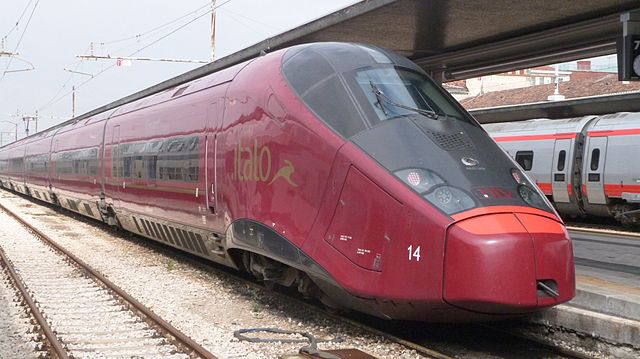 |
| Image credit: Peter Broster / Wikimedia Commons |
Top Speed: 360 km/h (224 mph)
Operational Speed: 320 km/h (199 mph)
Train length: 433.1 feet (132 meters)
Passengers' capacity: 460
Formation: 7 cars
Country: Italy
Manufacturer: Alstom
Year manufactured: 2010
Automotrice à grande vitesse (AGV) 575 is an electric multiple-unit, high speed trains. It is one of the eco-friendly and undeniably one of the fastest trains in the world. It is less noisy and much of its vibrations are eliminated.
In 2008, the NTV which is an Italian transport company get 25 of the trains that are the AGV 575. The body of the trains is made from carbon and aluminum. It is 272 tonnes in weight, 2.985 mm in width with 1,155 mm in floor height.
13. Shinkansrn E5 & H5 Series
 |
| The E5 Series. Image credit: Toshinori baba |
Top Speed: 360.5 kmph (224 mph)
Operational Speed: 320 km/h (200 mph)
Train length: 830 feet (253 meters)
Passengers' capacity: 731
Formation: 10 cars
Country: Japan
Manufacturer: Hitachi, Kawasaki Heavy Industries
Year manufactured: 2009 to present (E5) & 2014 to 2015 (H5)
The E5 has been in service since 2011 while the H5 enter the service in 2016. A number of 46 trainsets of E5 have been built so far while just 4 trainsets of H5 have been built.
 |
| The H5 Series. Image credit: Toshinori baba |
JR East (East Japan Railway Company) is operating the E5 series while JR Hokkaido (Hokkaido Railway Company) is operating the H5 series.
The Fastech 360S train serves as the bases for the designs of the exterior of the
train. Each of the trains is 12 feet (3,650 mm) in height, 11 feet (3,350 mm) in
width, and on average 453.5 tones in weight. Both Series are the 13th among the fastest trains in the world in 2025.
12. Bombardier Zefiro 380
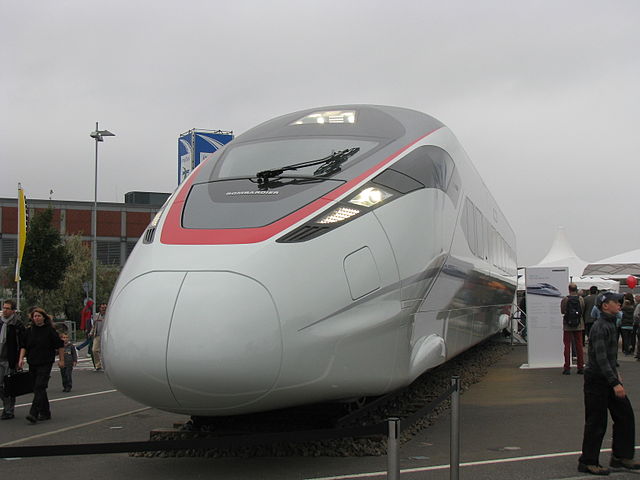 |
| Image credit: Björn König |
Top Speed: 380 km/h (236 mph)
Operational Speed: 350 km/h (220 mph)
Train length: 1,405 feet (428.1 meters) for 16 cars &
706 feets (215.3 meters) for 8 cars
Passengers' capacity: 1,336 for 16 cars & 650 seats for 8
car trainset
Formation: 8 &16 cars trainsets
Country: China
Manufacturer: Bombardier, AnsaldoBreda
Year manufactured: 2009 to present
Among the very high speed (VHS) trains which are the fastest trains in the world, it has the highest seating with the highest passengers capacity.
In 2009, China ordered 80 of the very trains, including 8 and 16 car sets. The train is 13.5 feet (4.16 meters)
tall and it is 11.1 feet (3.4 meters) wide. Its body is made of aluminum and
its empty weight is 462 tones and 1,088 tones depending on how long it is.
11. Talgo AVRIL HSR
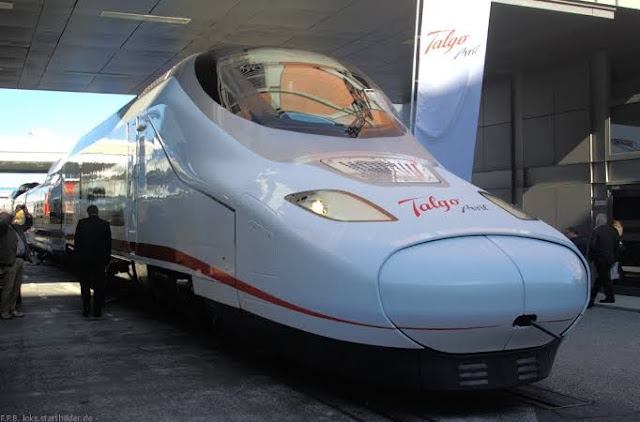 |
| Image credit: Tegeler from Berlin, Germany / Wikimedia Commons |
Top Speed: 380 km/h (240 mph)
Operational Speed: 330 km/h (205.1 mph)
Train length: 662.4 feet (201.9 meters)
Passengers' capacity: more than 600
Formation: 14 cars
Country: Spain
Manufacturer: Talgo
Year manufactured: 2014
It is a Light High-Speed Independent Wheel train known as Alta Velocidad Rueda Independiente Ligero (AVRIL). It is one of the most advanced trains made by Talgo and of course one of the fastest trains in the world in 2025.
Apart from its high speed, its fuel consumption is low and it
has a single deck with a large capacity for passengers. It is a lighted
high-speed train with less weight, this helps in the reduction of the cost of
production of the train.
See also:
10. Frecciarrossa 1000
 |
| Image credit: ILSA / Wikimedia Commons |
Top Speed: 400 km/h (248.5 mph)
Operational Speed: 360km/h (223.7mph)
Train length: 663 feet (202 meters)
Passengers' capacity: 457
Formation: 8 cars
Country: Italy
Manufacturer: Hitachi Rail Italy and Alstom
Year manufacturer: 2013 to present
It was able to achieve the speed due to its 16 powerful engines, distributed on all its coaches. The train receives a certification of environmental impact (EPD), as it is environmentally friendly. It is less noisy and vibrates less and its CO2 emission is little which is 28 micrograms.
The train is equipped with (ERTMS/ETCS) which is the most advanced technological system for controlling the speed of the train. It also has a CCTV system and a system that helps in maximizing the safety of travelers. It is one of the fastest trains in the world in 2025.
9. Siemens Velaro E
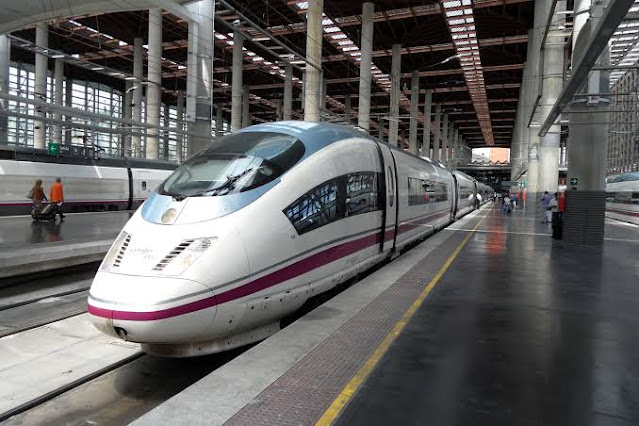 |
| Image credit: Falk2 |
Top Speed: 403.7 km/h (250.8 mph)
Operational Speed: 380 km/h (240 mph)
Train length: 656 feet (200 meters)
Passengers' capacity: 536
Formation: 8 cars
Country: Spain
Manufacturer: Siemens Mobility
Year manufactured: 2001
Number built: 26
This train reached the top speed mentioned above in July
2006 on the track of the Madrid-Barcelona between Calatayud and Guadalajara. It
was the highest speed recorded in Spanish record. It holds the record until 2010
that ICE and TGV supersede the record.
8. Fuxing Hao CR 400AF
 |
| Image credit: N509FZ / Wikimedia |
Top Speed: 418 km/h (260 mph)
Operational Speed: 350 km/h (220 mph)
Train length: 1,358.2 feet (414 meters (CR400AF–A)) &
1,443.1 feet (439.9 meters (CR400AF–B))
Passengers' capacity: 1,193 (CR400AF–A) & 1, 283
(CR400AF–B)
Formation: 16 cars (for CR400AF–A) & 17 cars (for
CR400AF–B)
Country: China
Manufacturer: CRRC Qingdao Sifang
Year manufactured: 2017
Even in subarctic climates, like -40 °C temperature, this train can reach a high speed of 350km/h. This train is part of the high-speed bullet train of the Fuxing Hao family and they are said to be efficient in their operations and more reliable that enriched travel experience for passengers.
In
similarity to this CR400AF version, is the model CR400BF. It was introduced to
the service in 2017, on the Beijing-Shanghai high-speed railway line. The
CR400AF-B is extra-long with an additional car.
The two versions are 11 feet (3,360 mm) in width and 13.1 feet (4,050
mm) tall.
7. HEMU-430X
 |
| Image credit: Minseong Kim |
Top Speed: 430 km/h (267.2 mph)
Operational Speed: 370 km/h (230 mph)
Train length: 484 feet (147.4 meters)
Passengers' capacity: 381
Formation: 6 cars
Country: South Korea
Manufacturer: Hyundai Rotem
Year manufactured: 2010–2011
The high-speed electric multiple unit (HEMU) train is capable of reaching 430 km/h, hence its name HEMU 430X. The building of the train cost $79.69 million. And it is the 7th among the fastest trains in the world today.
The two end cars are 77.1 feet (23.5 m) in length while the intermediate cars are 82 feet (25.1 meters) in length. The height of the train is 12.2 feet (3,720 mm) and the width is 10.2 feet (3,100 mm). Its body is made of Aluminum.
In
comparison to prior South Korean high-speed trains, it is better as the train's
important technological feature is distributed traction. EMU-320, EMU-250, and
EMU-260 are the commercial type of this train, the distribution of these commercial
trains started in the year 2020.
6. Shangai Maglev
 |
| Image credit: User Alex Needham (own photography) on en.Wikipedia |
Top Speed: 431 km/h (268 mph)
Operational Speed: 350 km/h (220 mph)
Train length: 504 feet (153.6 meters)
Passengers' capacity: 574
Formation: 3
Country: China
Year manufactured: 2010
It is a magnetic levitation train also called the Shanghai Transrapid. It is the fastest commercial train in the world in 2025. During a test run, the train reached 501km/h in 2003. In two minutes, it usually reaches 350 km/h (220 mph).
With its high speed, it only takes less than 8 minutes from
one end to the other of its route which is a 30.5 km (19 miles) track. The
project of the train cost $1.2 billion (USD), this includes the train and its
track. The train is not considered by many people because it is expensive, it
is usually taken by few
passengers.
See also:
5. CRH380A Hexie
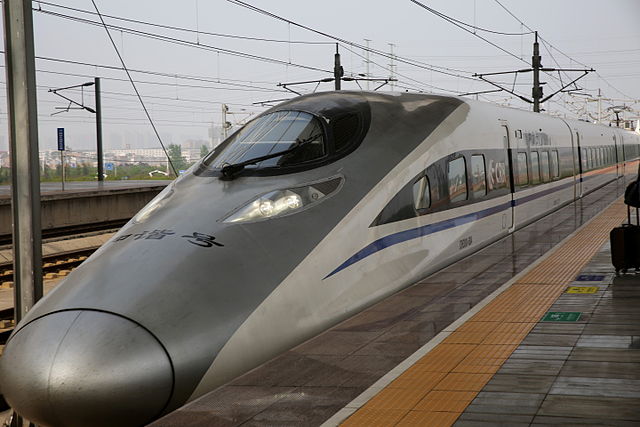 |
| Image credit: A1AA1A / Wikimedia |
Top Speed: 486.1 km/h (302 mph)
Operational Speed: 350 km/h (217 mph)
Train length: 1,317 feet (401.4 meters) for CRH380AL &
666 feet (203 meters) for EC Type
Passengers' capacity: 494
Formation: 8 cars (EC Type) &16 cars (CRH380AL)
Country: China
Manufacturer: CSR Qingdao Sifang Locomotive & Rolling
Stock Co., Ltd
Year manufactured: 2010
The train is of two types that are in service, the EC Type which has 8 cars, and the CRH380AL (14M2T) with 16 cars. The train is very fast that when it was tested it reach 350km/h. In the video below, the train is running at the speed of 350 Kmph.
It is one of the fastest trains in
the world and it replaces the CRH2 in China since it is faster with its high
speed and also matches the need of the country's development. The height of the
train is 12.1 feet (3,700mm), and its width is 11.1 feet (3,380).
4. TGV POS
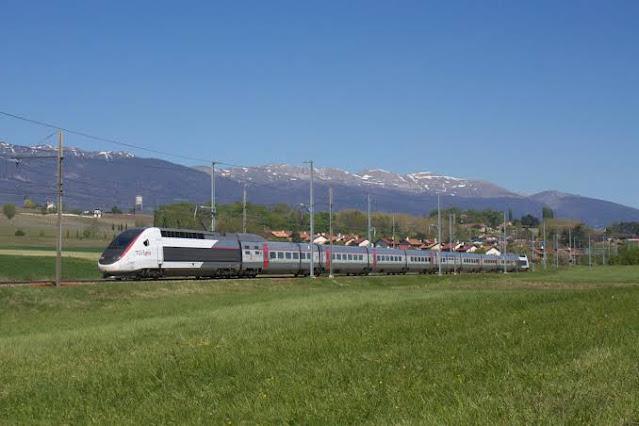 |
| Image credit: NAC |
Top Speed: 574.8 km/h (357.2 mph)
Operational Speed: 320 km/h (199 mph)
Train length: 656.9 feet (200.19 meters)
Passengers capacity: 485
Formation: 2 cars & 8 trailers
Country: French
Manufacturer: Alstom
Year manufactured: 2006
Number of the trains built: 19
This train has a unique feature, in case there is a failure, the cars have asynchronous motors that help separate each motor in a powered bogie. The TGV POS train rails in a high-speed rail line that connects France to Germany and Switzerland.
It runs between Basel and Zurich in Switzerland, as well as between Vallorbe and Lausanne, on the Paris-Vallorbe line. The train is operated under the TGV Lyria brand.
3. JR Central MLX01 Maglev Train
 |
| Image credit: Daylight9899 / Wikimedia Commons |
Top Speed: 581 km/h (361 mph)
Operational Speed: 531 km/h (330 mph)
Train length: 100.9 meters (330.9 feet) or 149.5 meters
(490.3 feet), depending on the number of cars
Passengers' capacity: 68
Formation: 3 to 5 cars
Country: Japan
Manufacturer: Central Japan Railway Company (JR Central) and
the Railway Technical Research Institute
Year manufactured: 1996 to 2001
MLX means Magnetic Levitation, eXperiment. The head cars have two styles of design: aero-wedge and double cusp. Both designs help in improving the high speed as they reduce its aerodynamic resistance. It is the 3rd among the top 10 fastest trains in the world in 2025.
On the Yamanashi Maglev Test Line, this train was the first to be tested there. The train was built for experimental purposes. The maximum speed mentioned above was reached in 2003 and broke a world record then.
With regards to its speed, it has broken many world records including the various world relative passing speed records. Both end cars are 91.8 feet (28 m) long, 10.8 feet (3.32 m) high and 9.5 feet (2.9 m) wide.
While the middle cars' length is between 79 to 79.7
feet (21.6 and 24.3 m). It seems it may no longer be in service as it is used in experiments.
2. CRRC Qingdao Sifang 2021 Maglev
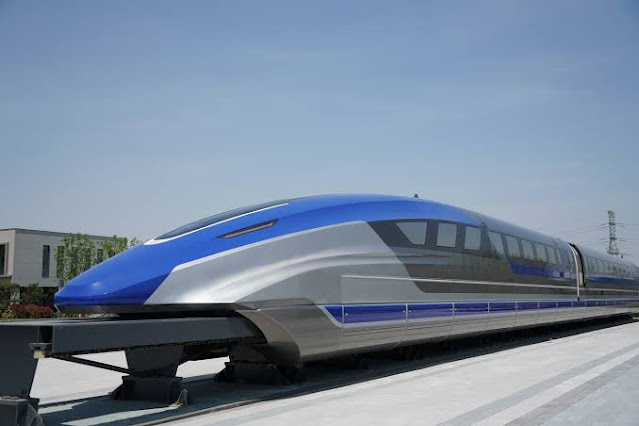 |
| Image credit: Crrcgc.cc |
Top Speed: 600 km/h (373 mph)
Operational Speed: 350 km/h (217.5 mph)
Formation: 5 to 10 (depending on the need)
Passengers' capacity: more than 900
Country: China
Manufacturer: CRRC Qingdao Sifang Co., Ltd
Year manufactured: 2021
The train is able to achieve that speed because its only resistance is the air and its moves by means of the electromagnetic force between the track and the train.
Even though it has a large passenger capacity, it is said to be reliable and safe. In terms of actual travel time, the train is very fast for a journey within 1,500 km.
From Shanghai to Beijing in China, it takes 2
hours by airplane whereas this train takes 2.5 hours. This train helps in
achieving China's goal of creating circles for a 3-hour journey.
1. Japan's LO Series Maglev
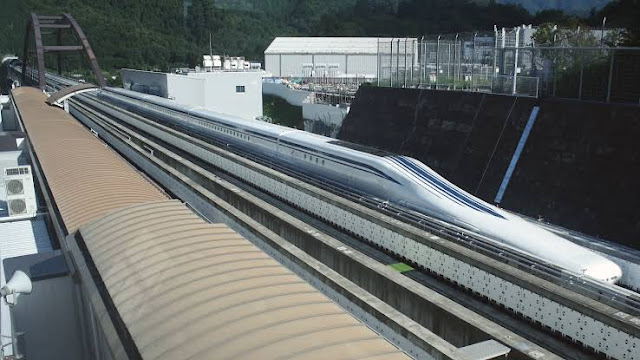 |
| Image credit: Saruno Hirobano |
Top Speed: 603 km/h (375 mph)
Operational Speed: 505 km/h (314 mph)
Train length: 981 feet (299 meters)
Formation: 12 cars
Passengers' capacity: 728
Country: Japan
Manufacturer: Mitsubishi Heavy Industries, Nippon Sharyo
Year manufactured: 2012
It is the No. 1 fastest train in the world, the fastest maglev train as well and it can be easily differentiated from other trains with its extremely long nose that helps in decreasing the consumption of energy, and importantly increasing its speed by reducing the train's drag.
Its long nose is 49 feet (15 meters) in length, the long nose also helps in reducing the noise. The end cars can accommodate 24 passengers and are 92 feet (28 meters) long, while intermediates cars are 80 feet (24.3 meters) long.
The train has a camera at the front of the two end cars which helps in remote operation, with this, a driver is not important or required.
What are your thoughts on these fastest trains in the world
in 2025? Let us hear from you in the comments section below (Post a comment).
Please share this article. You can follow us on our social media handles or you
can subscribe to our mailing list for new updates. Thanks for reading!

I which I could have the opportunity to board the second fastest train.
ReplyDeleteIt would be a nice experience.
DeletePost a Comment